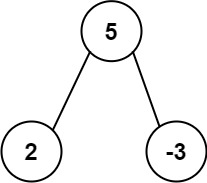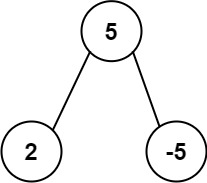Problem: Given the root of a binary tree, return the most frequent subtree sum. If there is a tie, return all the values with the highest frequency in any order.
The subtree sum of a node is defined as the sum of all the node values formed by the subtree rooted at that node (including the node itself).
Example:

Input: root = [5,2,-3] Output: [2,-3,4]

Input: root = [5,2,-5] Output: [2]
Approach: We can use Preorder traversal here to solve this question. Approach is straight forward, can be understood easily by just looking at the implementation.
Implementation in C#:
public int[] FindFrequentTreeSum(TreeNode root)
{
if (root == null)
{
return null;
}
Dictionary<int, int> sumFreqMap = new Dictionary<int, int>();
this.FindFrequentTreeSumPreOrder(root, sumFreqMap);
HashSet<int> result = new HashSet<int>();
int maxFreq = 0;
foreach (var sumItem in sumFreqMap)
{
if (maxFreq < sumItem.Value)
{
result.Clear();
result.Add(sumItem.Key);
maxFreq = sumItem.Value;
}
else if (maxFreq == sumItem.Value)
{
result.Add(sumItem.Key);
}
}
return result.ToArray();
}
public int FindFrequentTreeSumPreOrder(TreeNode node, Dictionary<int, int> sumFreqMap)
{
if (node == null)
{
return 0;
}
if (node.left == null && node.right == null)
{
if (!sumFreqMap.ContainsKey(node.val))
{
sumFreqMap[node.val] = 0;
}
++sumFreqMap[node.val];
return node.val;
}
int leftSum = FindFrequentTreeSumPreOrder(node.left, sumFreqMap);
int rightSum = FindFrequentTreeSumPreOrder(node.right, sumFreqMap);
int subTreeSum = node.val + leftSum + rightSum;
if (!sumFreqMap.ContainsKey(subTreeSum))
{
sumFreqMap[subTreeSum] = 0;
}
++sumFreqMap[subTreeSum];
return subTreeSum;
}
Complexity: O(n)
No comments:
Post a Comment